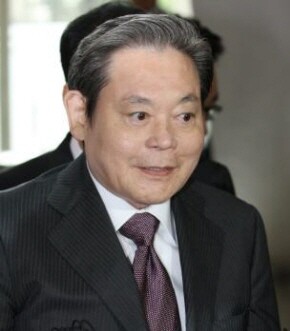hankyoreh
Links to other country sites 다른 나라 사이트 링크
[Analysis] Presidential pardon for former Samsung Group Chairman Lee Kun-hee appears imminent

“All that remains is the president‘s decision,” said key Cheong Wa Dae (the presidential office in South Korea or Blue House) officials Thursday about a special pardon for former Samsung Group Chairman Lee Kun-hee. The Justice Ministry, sporting world and business world have already sent their petitions to President Lee Myung-bak asking for a pardon for Lee Kun-hee, while on the other side, politicians and some presidential aides have advised caution. All that remains is a final decision by President Lee on whether to pardon Lee Kun-hee, and if so, when and how. According to Cheong Wa Dae aides, President Lee is considering three factors in regards to the pardon.
The first is the issue of law and order, an idea that has been stressed by this administration. When it came time to hand out special pardons on Aug. 15 of last year, President Lee said his administration would not be showing leniency on matters of corruption and illegalities committed by high-ranking individuals in either the government or civil sectors. A key Cheong Wa Dae official said although Lee attached the proviso of illegalities that took place during his term as president, he may feel especially burdened to issue a pardon for the former chairperson of Samsung. In a memo submitted to the Justice Ministry, the Anti-Corruption & Civil Rights Commission (ACRC), and Ministry of Government Legislation on Wednesday, President Lee had asked them to maintain a tough attitude on crimes committed by all, including major leaders in society. He urged the respective institutions to work to minimize the paradox of being lenient on public leaders and high officials when the general public is being required to abide by law and order. Lee said only in applying law and order regardless of rank could South Korea boost its national prestige and become an advanced nation. Accordingly, observers suggest regardless of how it is packaged, whether for the sake of social unity, vitalizing the economy or drawing the Winter Olympic games to South Korea, pardoning Lee Kun-hee would draw criticism for ultimately contradicting the administration’s stance on law and order.
The second issue is even if the pardon is granted, Pyeongchang’s chances to serve as host for the 2018 Winter Olympic Games remain questionable. Multiple Cheong Wa Dae officials have said the sports world claims that if Lee Kun-Hee were pardoned and his IOC credentials restored, it would be a great help in the effort to win hosting rights, but South Korea has lost the bid twice before, and nobody can assure that Lee would succeed in a third try. One official says that if it were assured that a pardon would bring the Olympic Games to Pyeongchang, President Lee would endure the criticism and hand out the pardon, but the forecast remains too unclear.
The third issue revolves around public criticism that the Lee administration is pro-chaebeol. For President Lee, who has worked since June to escape his pro-business image by espousing centrist pragmatism and pro-poor policies as the tenor of his administration, pardoning Lee Kun-hee could easily undo his efforts. Indeed, his exclusion of corporate figures from the group of Aug. 15 pardons was to stress the pro-common folk tenor of his administration.
Observers note many within the Cheong Wa Dae say President Lee will push through with the pardon despite these three major areas of concern. They say that in the event of a pardon, several dozen corporate figures, including Lee, could be pardoned in mid-January.
Please direct questions or comments to [englishhani@hani.co.kr]
Editorial・opinion
![[Column] Park Geun-hye déjà vu in Yoon Suk-yeol [Column] Park Geun-hye déjà vu in Yoon Suk-yeol](https://flexible.img.hani.co.kr/flexible/normal/500/300/imgdb/original/2024/0424/651713945113788.jpg) [Column] Park Geun-hye déjà vu in Yoon Suk-yeol
[Column] Park Geun-hye déjà vu in Yoon Suk-yeol![[Editorial] New weight of N. Korea’s nuclear threats makes dialogue all the more urgent [Editorial] New weight of N. Korea’s nuclear threats makes dialogue all the more urgent](https://flexible.img.hani.co.kr/flexible/normal/500/300/imgdb/original/2024/0424/7317139454662664.jpg) [Editorial] New weight of N. Korea’s nuclear threats makes dialogue all the more urgent
[Editorial] New weight of N. Korea’s nuclear threats makes dialogue all the more urgent- [Guest essay] The real reason Korea’s new right wants to dub Rhee a founding father
- [Column] ‘Choson’: Is it time we start referring to N. Korea in its own terms?
- [Editorial] Japan’s rewriting of history with Korea has gone too far
- [Column] The president’s questionable capacity for dialogue
- [Column] Are chaebol firms just pizza pies for families to divvy up as they please?
- [Column] Has Korea, too, crossed the Rubicon on China?
- [Correspondent’s column] In Japan’s alliance with US, echoes of its past alliances with UK
- [Editorial] Does Yoon think the Korean public is wrong?
Most viewed articles
- 1‘We must say no’: Seoul defense chief on Korean, USFK involvement in hypothetical Taiwan crisis
- 2N. Korean delegation’s trip to Iran shows how Pyongyang is leveraging ties with Moscow
- 3‘Weddingflation’ breaks the bank for Korean couples-to-be
- 4Will NewJeans end up collateral damage in internal feud at K-pop juggernaut Hybe?
- 546% of cases of violence against women in Korea perpetrated by intimate partner, study finds
- 6[Column] Park Geun-hye déjà vu in Yoon Suk-yeol
- 7“Parental care contracts” increasingly common in South Korea
- 8[Column] Yoon’s first 100 days should open our eyes to pitfalls of presidential system
- 9[Interview] Dear Korean men, It’s OK to admit you’re not always strong
- 10[Editorial] New weight of N. Korea’s nuclear threats makes dialogue all the more urgent